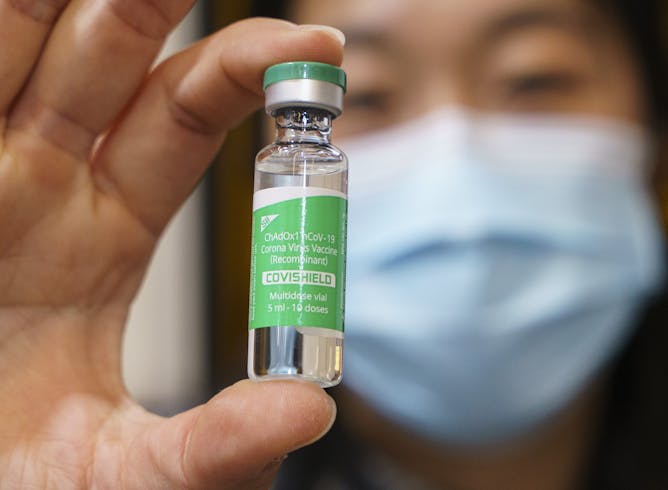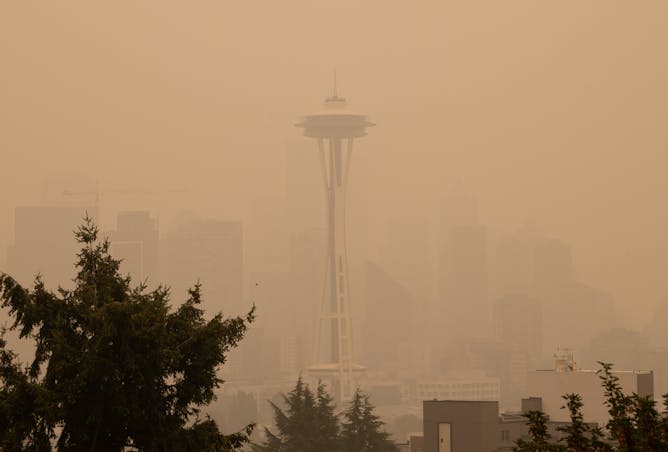|
Hundreds of thousands of Canadians received a first dose of AstraZeneca’s COVID-19 vaccine this spring, before the vaccine was linked to very rare but serious blood clots. With second doses on the horizon, many people have questions about getting another shot.
Today in The Conversation Canada, McMaster University immunologists Dawn Bowdish and Ishac Nazy answer some common questions about second doses of AstraZeneca’s vaccine. They cover safety and mixing vaccines, as well as blood clot risks and symptoms to watch for.
Also today:
|

A healthcare worker holds up a vial of the AstraZeneca vaccine at a COVID-19 vaccination clinic in Montréal, on March 18.
THE CANADIAN PRESS/Paul Chiasson
Dawn ME Bowdish, McMaster University; Ishac Nazy, McMaster University
Answers to key questions about rare blood clots linked to AstraZeneca's COVID-19 vaccine, including risks, symptoms and whether people who have had one AstraZeneca shot should have a second.
|

Global governance of artificial intelligence is necessary to regulate AI industries.
(Shutterstock)
Eleonore Fournier-Tombs, McGill University
The new EU regulation is about to change the way we do artificial intelligence. The United Nations needs to follow suit.
|

People with a plan feel more empowered and self-reliant during wildfire disasters. They have better mental and physical health outcomes than those who were less prepared.
(Shutterstock)
Sarah Henderson, University of British Columbia; Mike Flannigan, University of Alberta
Wildfire smoke is both inevitable and largely unpredictable. We need to change our activities and behaviours to limit exposure to wildfire smoke and protect health.
|

An Ontario pilot project showcases a circular food model that results in delicious food produced via regenerative agriculture practices.
Unsplash
Sarah Tranum, OCAD University
There are many hard lessons learned from the pandemic; one is that our food system needs a serious reboot. Luckily, we need only look to nature’s cycles for clues on how to fix it.
|

Literacy is much like learning to ride a bike: young kids can only advance to “tricks” when they learn how to balance a number of other complex and inter-related activities.
(Shutterstock)
Hetty Roessingh, University of Calgary
Accessing "knowledge-rich" content assumes language and literacy competencies that take time for children to develop. Childhood cannot be rushed.
|

Grâce aux données massives, l’IA pourrait permettre d'estimer les risques de développer une maladie au cours de sa vie en se basant sur de des centaines de facteurs de risque.
(Shutterstock)
Alexandre Castonguay, HEC Montréal; Cécile Petitgand, Université de Montréal; Guy Paré, HEC Montréal
L’importance d’améliorer l’efficacité du système de santé canadien apparaît comme une nécessité et l’IA constitue un levier incontournable pour faire face à cet enjeu.
|

L'ancien président américain Donald Trump prend la parole lors d'une conférence à Orlando, en Floride, en février 2021. Les personnes qui, comme lui, présentent des traits narcissiques et psychopathiques ont un fort désir de domination et occupent de façon disproportionnée des postes de direction.
(AP Photo/John Raoux)
Steve Taylor, Leeds Beckett University
Les entreprises (et les partis politiques) devraient être en mesure de dépister la psychopathie et le narcissisme chez les candidats à la direction.
|
Business + Economy
|
-
Peter Siminski, University of Technology Sydney
For those born around 1950, 84 per cent earned more at age 30-34 than their own own parents did at the same age. It has been about 68% for those born since the early 1960s.
|
|
COVID-19
|
-
Gabriel Recchia, University of Cambridge
Some so-called superforecasters are claimed to have predicted the course of the pandemic better than scientific experts.
|
|
Culture + Society
|
-
Micaela Sahhar, The University of Melbourne
Just as BLM is forcing a reckoning with systemic racism, there is new attention being paid to the origins of the Palestinians' struggles.
|
|